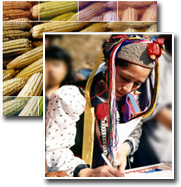|
|
|
Welcome! This site requires some major revisions and we apologize for any inconvenience you might have as a visitor to be able to access information of interest to you. ¡Bienvenido! Este sitio requiere algunas revisiones importantes y nos disculpamos por cualquier inconveniente que pueda tener como visitante para poder acceder a información de su interés. Dialogue Between Nations is an interactive communications network and an educational forum contributing, through global dialogue, towards the solutions of current issues directly affecting the identity, self-determination and presence of Indigenous Peoples in the modern world. Underlying this unique initiative is the human tragedy of silent genocide. Diálogo Entre Naciones es una red interactiva y global de comunicación y un foro educativo que contribuye a través del dialogo global hacia la solución de los problemas actuales que afectan directamente la identidad, la libre determinación y la presencia de los Pueblos Indígenas en el mundo moderno. Detras de esta iniciativa singular esta la tragedia humana del genocidio silencioso.
 UN PERMANENT FORUM ON INDIGENOUS ISSUES OFFICIAL WEBSITE The United Nations Permanent Forum on Indigenous Issues (UNPFII) is an advisory body to the Economic and Social Council (ECOSOC), with a mandate to discuss indigenous issues related to economic and social development, culture, the environment, education, health and human rights. Twelfth Session of the Permanent Forum 20 - 31 May 2013 UN Headquarters, New York Review Year >>>Click here for more information EL FORO PERMANENTE PARA LAS CUESTIONES INDIGENOUS DE LA ONU El Foro Permanente para las Cuestiones Indígenas de la ONU es un organismo asesor del Consejo Económico y Social, con el mandato de examinar las cuestiones indígenas relacionadas al desarrollo económico y social, la cultura, la educación, la salud, el medio ambiente y los derechos humanos. 12o período de sesiones del Foro Permanente 20 - 31 de mayo de 2013 Naciones Unidas, Nueva York Mas información aquí>>> DIALOGUE BETWEEN NATIONS IN-DEPTH COVERAGE OF THE UN PERMANENT FORUM ON INDIGENOUS ISSUES 2002 THROUGH 2012 Listen to audio recordings of the UN Permanent Forum Eighth to Eleventh Sessions 2009 - 2012 Versions available: Original, English, Spanish (español) Escuche las grabaciones de audio del Foro Permanente de las sesiones octavo a undécimo 2009 - 2012 Versiones disponibles: Original, Inglés, castellano (español) For links, comments and information about the 2013 Permanent Forum session we invite you to visit and join our Dialogue Between Nations Facebook group Para enlaces, comentarios e información acerca de la session del Foro Permanente 2013 te invitamos a visitar y unirse a nuestro grupo de Facebook Diálogo Entre Naciones  Selections from the Kari-Oca 1992 Press Conference UNCED, Rio de Janeiro, Brazil  Kari-Oca to Kimberley (English) 1992 - 2002 De Kari-Oca a Kimberley (Español) |
|||||||
|
|







![Declaration [Arabic]](HomeImages/ArabicText.jpg)
![Declaration [Chinese]](HomeImages/ChineseText.jpg)

